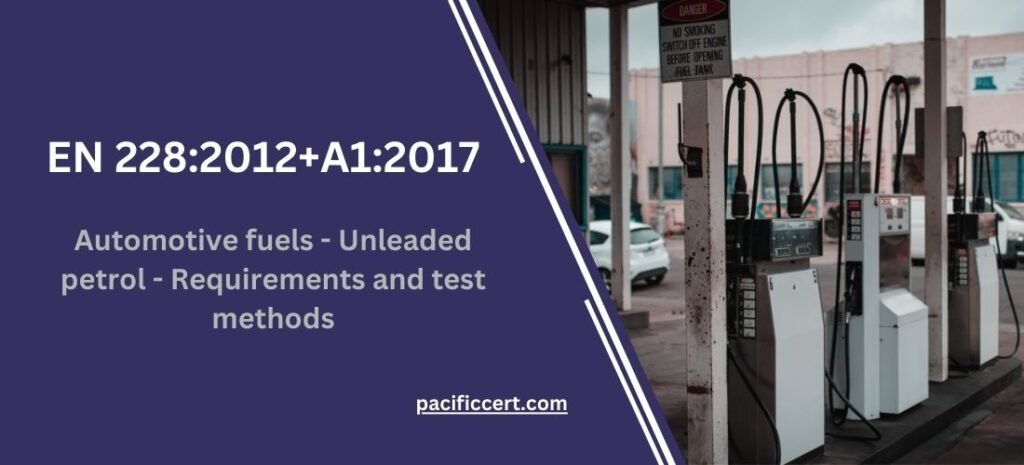
What is EN 228:2012+A1:2017-Automotive fuels – Unleaded petrol – Requirements and test methods?
EN 228:2012+A1:2017 is a European standard that specifies the requirements and test methods for unleaded petrol, which is used as fuel for spark ignition engines in vehicles.
The standard includes specifications for several key characteristics of unleaded petrol, including:
Octane number
Density
Distillation characteristics
Oxygenate content
Emission-related properties
Overall, EN 228:2012+A1:2017 ensures that unleaded petrol used in vehicles in Europe meets certain quality standards and is safe and suitable for use in spark ignition engines.
Requirements of EN 228:2012+A1:2017
Octane number: The minimum and maximum octane numbers are specified. To ensure the fuel provides sufficient resistance to knocking, which can damage the engine.
Density: The density of the fuel is measured to ensure it falls within a specified range, which helps to ensure consistent fuel consumption and engine performance.
Distillation characteristics: The standard specifies test methods to determine the boiling range of the fuel, which helps to ensure the fuel vaporizes and ignites properly in the engine.
Oxygenate content: This standard includes limits on the content of oxygenates in the fuel. Such as ethanol or methanol, which can affect the fuel’s properties and engine performance.
Emission-related properties: The standard also includes limits on the content of sulfur and other impurities in the fuel. Which can affect emissions and the operation of catalytic converters in vehicles.
EN 228:2012+A1:2017 sets out test methods for measuring each of these characteristics, as well as other properties of the fuel. Such as volatility and vapor pressure. These test methods help to ensure that unleaded petrol meets the specified requirements and is safe and suitable for use in spark ignition engines.
Benefits of EN 228:2012+A1:2017
Improved engine performance: The requirements and test methods in EN 228 help to ensure that unleaded petrol provides consistent and reliable performance in spark ignition engines. Thus, this helps to prevent engine damage and improve fuel efficiency.
Reduced emissions: By setting limits on the content of sulfur and other impurities in unleaded petrol, this standard helps to reduce harmful emissions from vehicles. Which can have a positive impact on air quality and public health.
Increased safety: Unleaded petrol that meets the requirements of the standard is safe and suitable for use in spark ignition engines, which helps to prevent accidents and ensure that vehicles operate safely.
Harmonization: EN 228:2012 helps to ensure that the requirements for unleaded petrol are consistent across different countries and regions, which can make it easier for automakers and fuel suppliers to operate in different markets.
Also, Consumer protection: By specifying the requirements and test methods for unleaded petrol, this standard provides consumers with assurance that the fuel they are purchasing meets certain quality and safety standards.
Who needs EN 228:2012+A1:2017-Automotive fuels – Unleaded petrol – Requirements and test methods?
Fuel producers and suppliers: EN 228 sets out the requirements and test methods for unleaded petrol, which must be met by fuel producers and suppliers. To ensure that their products are safe and of high quality.
Vehicle manufacturers: Automotive manufacturers need to know the characteristics of the fuels their engines will use. Including unleaded petrol. So,Compliance with this standard ensures that the fuel characteristics are known and maintained over time.
Regulatory bodies: Government agencies responsible for the regulation of fuel quality and environmental protection may use this standard as a reference standard. To establish minimum quality and environmental requirements for unleaded petrol.
Also, Consumers: This standard provides assurance to consumers that unleaded petrol sold to them meets certain quality and safety standards.
At last, Pacific Certifications is accredited by ABIS, if you need more support with EN 228:2012+A1:2017, please contact us at +91-8595603096 or support@pacificcert.com
Read About: EN 208:2010







